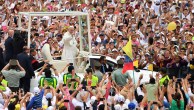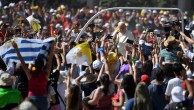For decades, Americans have been split over the question of whether organized religion should take an active role in politics. About half of the public (48%) is willing to see churches “express their views on day-to-day social and political questions.” But a comparable number (46%) feel that churches should keep out of political matters.1

Opinion on this question has fluctuated over the past 40 years. In 1968, 53% opposed political expression by the churches (40% favored it). By 1996 majority opinion had shifted — 54% felt that churches should express their views (43% said they should not). Today’s division of opinion is nearly identical to that found when the question was first asked in the late 1950s: in 1957, 48% supported the idea of churches expressing their views, while 44% objected.
Public opinion on this question is divided along religious rather than partisan lines. Republicans are only slightly more likely than Democrats to support the notion of churches expressing their political views. But mainline and evangelical Protestants have vast differences of opinion over whether religious groups should weigh in on politics. Nearly two-thirds (65%) of white evangelicals favor churches expressing political views, while only one-third of white mainline Protestants feel this way.
The gaps are even larger when comparing highly committed evangelicals (75% support) with other groups. Black evangelical Protestants are also very likely to support political expression by churches (70%). Overall levels of religious commitment, regardless of religious tradition, are also
related to opinion on this issue. Roughly two-thirds (68%) of those with a high level of commitment support political expression by churches, compared with 36% among those with a weak level of religious commitment.
Many Americans who may otherwise support political involvement by religious organizations draw the line at politicking from the pulpit. Nearly two-thirds of respondents (65%) say it is never right for clergy to discuss political candidates or issues from the pulpit; just 28% disagree and feel this is appropriate. Even among white evangelicals, 64% oppose politicking from the pulpit.
Again, generational patterns are apparent. The highest level of opposition is found among those age 65 and older — the age group with the highest levels of religious commitment. More than eight-in-ten (82%) senior citizens oppose priests and rabbis discussing politics. As with the question about churches expressing their views, opinion about politicking from the pulpit has been relatively stable over the past several decades.
When it comes to the question of whether publicly-funded facilities can be utilized by religious groups, the public is overwhelmingly supportive. More than eight-in-ten respondents (81%) said they would not object to public schools making facilities available after school hours for use by student religious groups or organizations (17% would object). Even a version of the question that mentioned religious groups or organizations, without reference to students, found 75% approving of this use of public facilities. This question relates to the issues at stake in the case of Good News Club v. Milford Central School, currently pending before the U.S. Supreme Court.
Religion Influences Policy Views
Clearly, religion plays an important role in shaping Americans’ views on public policy issues. When respondents were asked about several controversial issues — ranging from human cloning to gay civil unions — and what was the most important factor in shaping views on these subjects, religious belief tied with personal experience as the most frequently mentioned influence.
Overall, more than six-in-ten (61%) of the survey’s respondents said that religion was the most important influence on their opinion about at least one of seven issues probed. The same number cited personal experience at least once.
Not surprisingly, religion is cited as the most important influence on at least one issue by 88% of Americans who report a high level of religious commitment. But even among those with a low level of commitment, religious beliefs are most important on at least one issue for a third of respondents (33%).

Religion is cited as the most important influence by pluralities of respondents on three of the seven issues, and it comes in second on two others. It is especially important on two cultural issues in the news: gay marriage and human cloning. Forty percent of respondents cite religion as the most important influence on their views about gay marriage, and 35% do so regarding human cloning.
Older respondents are more likely than others to cite religious beliefs as most important on at least one attitude (73%), but even among the youngest respondents, 57% do so. Those who voted for George W. Bush are more likely than those who voted for Al Gore to cite religion on at least one question, but the difference is not as large — 70% among Bush voters, 59% among Gore voters. And even among respondents who say that churches should stay out of politics, 53% acknowledge the strong impact of religious beliefs on at least one of their opinions.
The survey confirms that religion continues to be a key source of conservative political opinion on cultural and sexual issues. Religion is a conservative influence most clearly on the issue of gay marriage, where 65% of those who oppose same-sex unions cite their religious beliefs as the most important influence on their views (among those with high levels of religious commitment, this figure rises to 80%). Similarly, 59% cite religious views as most important in their opposition to physician-assisted suicide, and 42% do so regarding opposition to human cloning.
On the liberal side, 42% of those who oppose the death penalty say their religious views most influenced their position on the issue. Among religiously-committed death penalty opponents, 62% cite their religious beliefs as a source of opposition. But only 15% of respondents who support more generous government assistance to the poor cite religion as their major influence; personal experience is more important on this issue. And just 12% cite religious beliefs as most important in their support for U.S. intervention to prevent genocide; the media is much more important to the views of both supporters and opponents of U.S. intervention.
Religion and Partisanship
The enduring political conservatism of white evangelical Protestants is well reflected in their partisan and ideological leanings. Republicans outnumber Democrats by about a two-to-one margin (47%-23%) among white evangelical Protestants, with 21% describing themselves as independents. A sizable plurality (34%) of white evangelicals identify themselves as conservative Republicans. Not surprisingly, evangelicals overwhelmingly backed Bush over Gore in last fall’s presidential election (52%-17%).

White mainline Protestants are far more moderate politically than white evangelicals and are split equally among Republicans and Democrats (34%-34%). As a group, white mainline Protestants backed Bush over Gore by 36%-31%. Ideologically, this group is divided among moderate-to- conservative Democrats (19%), conservative Republicans (18%), moderate-to-liberal Republicans (14%), and moderate independents (14%).
Black Protestants, by contrast, are far more homogeneous politically than their white counterparts. Both the black evangelical and mainline Protestants are overwhelmingly Democratic (69% mainline, 76% evangelical), and both groups backed Gore by huge margins in the presidential election.
Catholics More Diverse
Once an important part of the Democratic coalition, Catholics have become much more politically diverse. Nearly as many white non-Hispanic Catholics identify themselves as Republicans (33%) as Democrats (35%), and 27% are independents.
As a group, white non-Hispanic Catholics tend to resemble mainline Protestants in their political preferences and ideologies. They are divided similarly along party lines, and also backed Bush over Gore by a slight margin (35% to 31%).
But as is the case with Protestants, the two main groups of Catholics are far apart politically. Although similar proportions of liberal and traditional Catholics identify themselves as Democrats, liberal Catholics strongly supported Gore (40%-25%) in the presidential election, while traditional Catholics backed Bush (36%-29%). In addition, traditional Catholics are more likely than their liberal counterparts to identify with the Republican Party and to align themselves with its conservative wing.
Seculars: Less Connected
While seculars have virtually no association with organized religion, so too they have far less involvement with politics — and the two political parties — than those who are affiliated with churches or synagogues.
A modest majority of seculars (56%) are registered to vote. That is far below the registration rates in the major Christian denominations, which run in the 70%-80% range. Fully half of seculars are independents, while 26% are Democrats and 17% are Republicans. This group supported Gore over Bush for president (24%-17%).




